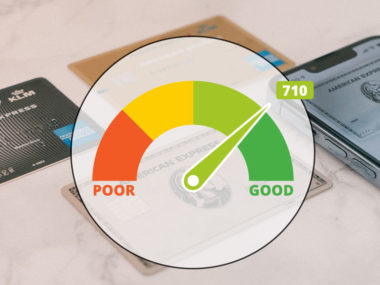Even for those who generally pay their bills on time, unexpected financial emergencies, or even simple oversights can cause you to fall behind on your payments. Regardless, any missed payment can have a negative impact on your credit score, meaning that future lenders might view you with less favor. Luckily, late payments don’t stay on your credit report forever.
Table of Contents
When Does a Late Payment Get Reported?
Payments that are over 30 days late are automatically reported to the credit bureaus. Typically, when viewing your credit report, you’ll see that late payments are listed by how late they are. Typically you’ll find that creditors will report late payments in 30 day stretches, meaning you’ll see 30-days late payments, 60-days late payments, 120-days late and so on.
How Does a Late Payment Affect Your Credit Score?
Credit payments make a big impact on your credit score. Your payment history is one of the biggest indicators of your dependabilities as a borrower. Late payments can indicate to creditors that you’re unreliable at repaying your debts, making them more unlikely to give you favorable terms of credit, and they may choose not to lend to you at all.
One Late Payment vs Many
Not all late payments are created equal, however. If you have pristine credit history and no history of late payments, one 30-day late payment may not affect your scores the same as a series of late payments. However, the more recent the late payment, the more it will impact your credit scores.
In essence, this means that one recent 30-day late payment might affect your credit score, and the probability of receiving another line of credit more so than a series of late payments from several years ago.
The sooner you are able to bring your account current, the sooner your credit scores will start to recover.
How Long Do Late Payments Stay on Your Credit Report?
Late payments remain on your credit report for up to seven years. If an account is still open when those seven years are up, that particular late payment will then be removed.
If, for example, you had a 30-day delinquent payment in January 2018, the late payment would be removed in January 2025, even if you are still making payments on the original balance.
Dispute Late Payment Errors on Your Credit Report
If you find that there is an error on your credit report, there are things you can do to correct the issue. You’re also not alone, as nearly 26 percent of credit reports have at least one error.
If you find an error that you’d like to dispute, there are a number of steps you can take to rectify it. Most importantly, you’ll have to draft a letter that includes your complete name and address, identify the items in your report that are in question, clearly explain why you dispute the information you deem to be inaccurate, and request a deletion or correction from whichever credit bureaus have incorrect information.
Avoid Late Payment Penalties
It’s important to stay on top of your bills, especially given the weight that timely payments have on your overall credit score. You can avoid late penalties in a number of ways. Scheduling automatic payments and sticking to a personal budget being just a few.
Still, there are a number of financial emergencies or unforeseen circumstances that may affect your ability to make payments on time. Perhaps you’ve recently lost your job, had a medical emergency, or an unexpected expense on your car that takes precedence.
If you find yourself in a position where you are unable to make a payment, it’s advisable that you reach out to your creditor to see if there is anything to be done in order to avoid late fees, extraneous charges, or having your account sent to collections. This is especially important if you’re falling behind on your home loan payments, as the foreclosure process can have a devastating impact on your credit score and your personal life.
Image Source: https://depositphotos.com/





